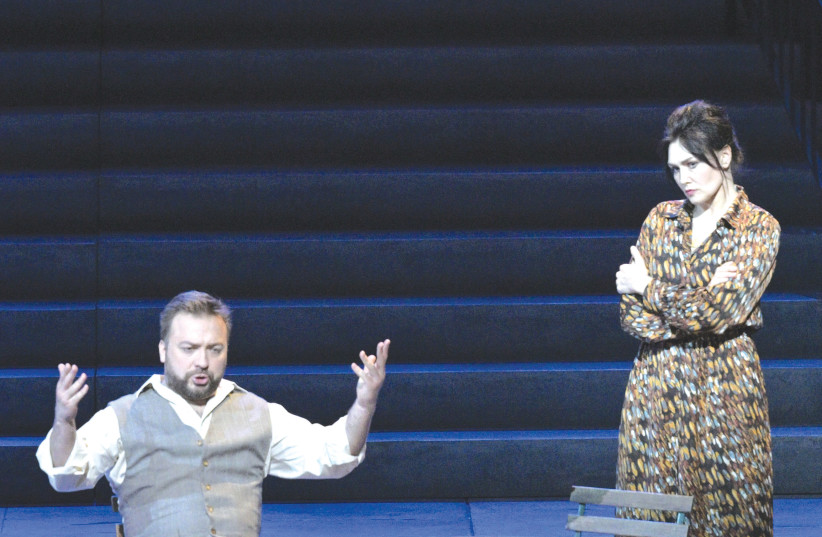Aleko and Cavalleria Rusticana
The Israeli Opera
January 16, Tel Aviv
Passion, honor and death clashed at a recent back-to-back production of two short operas, Sergi Rachmaninoff’s Aleko and Pietro Mascagni’s Cavalleria Rusticana, at the Israeli Opera. Sung in Russian and Italian, respectively, the performances greatly benefited from the ingenious set design by Gabriele Moreschi and the guiding hand of director Joan Anton Rechi.
The gypsy village under the night stars was soaking with Russian sadness as Aleko (Ionut Pascu) sang of how he tried in vain to escape the shackles of civilization only to discover the power of fate during “The Moon is High in the Sky” aria. Later, the set was transformed into a Sicilian village under a familiar sun, a nod to the skills of lighting designer Keren Granek, and a new tale swiftly began.
The Verismo style, embraced by Rachmaninoff and Mascagni at the beginning of their respective careers, is a true-crime story set at the opera and a change from the older Bel Canto style. If the older, beautiful singing style, focused on larger-than-life drama, such as in Gaetano Donizetti’s Lucia di Lammermoor, the newer, truer style attempts to give the audience a piece of the real world adapted to the opera.
Aleko is a Russian man who married the beautiful gypsy girl Zemfira (Alla Vasilevitsky). Like his famous operatic cousin Don José from Bizet’s Carmen, the attempt at crossing over into another culture ended badly. When a young gypsy (Valentin Dityuk, whom we last saw as Pinkerton in Puccini’s Madame Butterfly) sings to Zemfira that just as one cannot halt the moon in the night sky, one can not order a human heart not to love another (“Song of Young Gypsy” aria), we are compelled by sheer beauty to accept this proposition, even as we know it will lead to ruin.
This gem of Russian opera, based on the 1824 poem The Gypsies by Pushkin, was sung in the past by Fedor Chaliapine (Aleko), Konstantin Pluzhnikov (young gypsy) and Veronika Dzhioeva (Zemfira). While it is not possible to compare our own moment with that of Chaliapine, as the emotional demands of audiences change quickly, this Aleko was a roaring success. Vasilevitsky shone especially brightly during her performance and was rewarded with lavish praise by a grateful audience.

From Russia to Italy
When a whip was bought during the opening scene of Aleko, it cracked at Cavalleria Rusticana. We returned to the village but now, we were told a very different story. The church doors opened on Easter and the scorned Santuzza (Anastasia Boldyreva), her candle unlit, poured out her grief.
Psychotherapist Esther Perel often says the victim of an affair is not always the victim of the relationship. Mascagni mastered this idea.
Santuzza was seduced by Turiddu (Sergei Poliakov), who for his own part is in love with Lola (Anat Czarny). Sadly for them, Lola married the whip-wielding Alfio (Elchin Azizov) when Turiddu was serving in the military. However, now that Turiddu is back, he and Lola are seeing one another again, which makes Santuzza feel, well, betrayed.
Alfio, who uses his whip lavishly to speed his horses as he wanders the roads of Sicily in search of trade, is so enraged when Santuzza informs him of Lola’s actions that he vows to get even. The duet between the raging man and the jilted lover was awe-inspiring.
The norms and values of the Sicilian village, employed so skillfully by Mario Puzo when he penned the 1969 novel The Godfather, were readapted for the stage here. Did Sicilian men really challenge each other to a duel by taking a bite of an apple and offering it to their rival? Unlikely, but Rechi makes this seem as natural as throwing a fish into a house to say a rival “sleeps with the fishes.” We believe it because the performers do.
Poliakov deserves a special tip of the hat for the gentle and sensitive way he depicted Turiddu. When he refers to Alfio as a friend and invites him to drink wine with him and perhaps reason out what might be done, we do not sense cowardice. Instead, we feel the confusion of a man who followed his heart and ended up on the wrong end of a knife.
